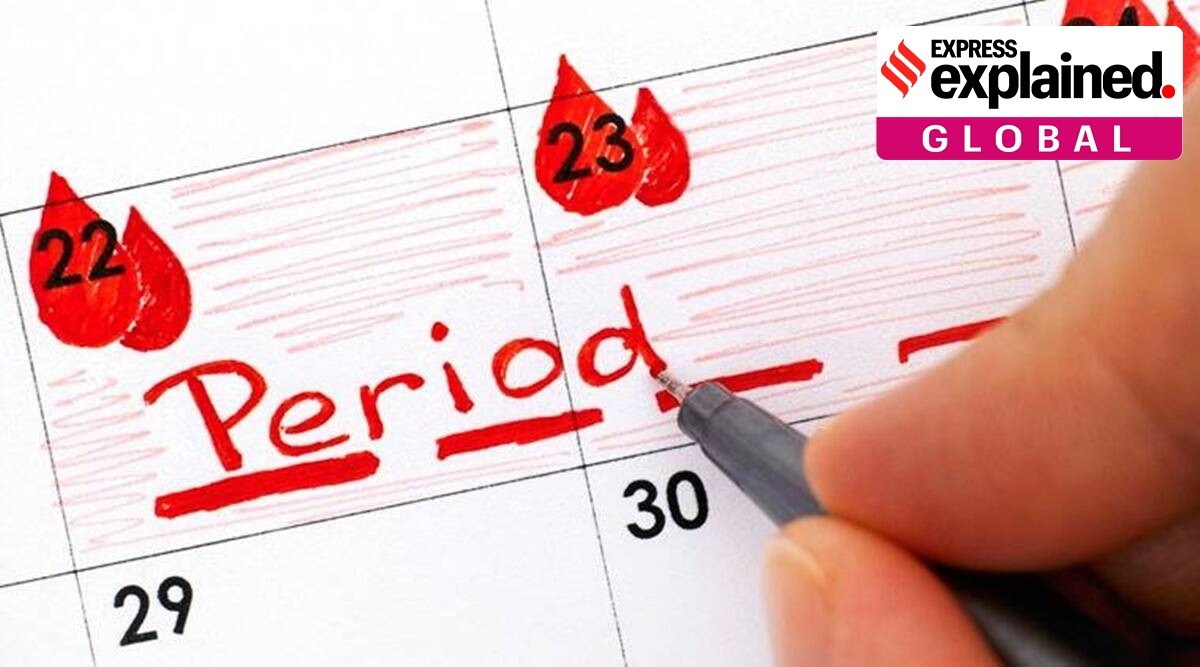Spain has become the first European country to introduce paid menstrual or period leaves, with a law passed on February 16. The government would foot the bill for the monthly paid leaves of three to five days, after a doctor’s note is shown. Also included in the law are provisions for free menstrual hygiene products that would be made available in educational centres, prisons, and social centres.
The Bill was supported by a “wide-ranging left-wing coalition”, while the conservative Popular Party and far-right Vox voted against, Politico reported. Paid menstrual leave has been slow to take hold as national policy in most countries. In India’s Supreme Court, a Public Interest Litigation (PIL) has been filed seeking menstrual leave for female students and working women across India, LiveLaw reported. Where does the leave apply, and what are the arguments for and against it? We explain.

What is the demand for paid menstrual leave?
Allowing women (as well as transgender people and those of other gender identities who experience menstruation) to avail the option of taking a few days’ leaves in a month has been advocated as a step towards better working conditions. It also recognises the different needs of those making up the workforce, particularly as multiple barriers already exist to women’s employment – such as workplace safety, problems in commuting to a workplace, etc.
While this is not a new idea, the concept has gained traction within the last decade. In 2017, a Bill was introduced by Ninong Ering, a Congress MP from Arunachal Pradesh, in the Lok Sabha for the purpose. It stated that women employed in a government-registered establishment and students of Class VIII and above would be entitled to paid leave or leave from the school, “as the case may be”, for four days during her menstruation.
Further, it stated that if a woman employee undergoing menstruation opts to work instead of taking leave, she shall be paid overtime allowance. However, the Bill never became law.
Where does the demand come from?
It has to do with recognising the biological changes experienced because of menstruation. Usually happening over four to seven days every month, menstruation can often be accompanied by pain, cramps, vomiting, nausea and irritability, etc. The intensity of these changes varies from person to person, though even that can change over months. Many women take pain medication, as a result.
Multiple reports and surveys point to how this impacts the productivity of women. In a study published in the British Medical Association, it was found over 80.7 per cent of around 32,000 Netherlands-based respondents reported decreased productivity for an average of 23.2 days a year. In India, a lack of information and access to sanitary products has led to many girls dropping out of school at puberty.
Story continues below this ad
The study also pointed to little to no naming of the issue – when women called in sick due to their periods, only 20 per cent told their employer or school that their absence was due to menstrual complaints. The secrecy and myths associated with menstruation have been flagged as a concern, preventing solutions – or advice on hygiene or pain relief – from being discussed.
In which countries have period leaves been introduced?
The measure for period leaves is not exactly new. Many Asian countries have them, the earliest being Japan. “When a woman for whom work during menstrual periods would be especially difficult has requested leave, the employer shall not have the said woman work on days of the menstrual period,” the law says.
Zambia’s law states, “A female employee is entitled to one day’s absence from work each month without having to produce a medical certificate or give reason to the employer.”
According to an article in Time Magazine, Russian workers in the 1920s first pioneered the concept. Since then it has made its way in some shape or form to countries like Taiwan and Indonesia. But the article added that one study in Japan showed very few takers of the leave, particularly at the level of high-paying positions.
Story continues below this ad
In India, states govern the subject of health and their experience has varied. The Kerala government said it would grant menstrual leave for female students studying in all state universities coming under the Department of Higher Education last month. Much earlier, Bihar under then Chief Minister Lalu Prasad Yadav introduced the provision in 1992.
But the measure, arguably, is yet to be normalised “The Patna University Teachers’ Association sought its implementation. However, most women professors, especially in co-educational colleges, found it awkward to ask for such a leave,” former Patna University history professor Bharati S Kumar earlier told The Indian Express.
The PIL to be soon heard by the SC also cited a study on the impact of menstruation on women’s health, and how Article 14 of the Indian Constitution (right to equality) is violated since some states have such policies in place while others do not.
Why is the idea of menstrual leave still contentious?
The experience of places where such laws are in place does not give a clear picture. One reason may be that the direct effects on employment and work satisfaction of women may be difficult to measure based on one policy.
Story continues below this ad
Where it has been in place, like in Japan, at times there have not been too many takers. This is because simply changing one policy does not lead to the removal of the taboos associated with menstruation and its discussion. Another argument says mandating paid leaves would discourage the hiring of women – who are already underrepresented in the workforce in most countries.
Further, these protections would highlight differences among employees, something that many women have at times refrained from emphasising to avoid discrimination. But with greater acknowledgement of the obvious difficulties caused because of menstruation, attempts are being made for inclusive policies by even private organisations, such as Zomato and Nike. The flexibility offered to employees in taking these leaves is one example, another is an all-around approach towards normalising menstruation, and making available clean public toilets, sanitary products and water in the workplace and wider public spaces.








































